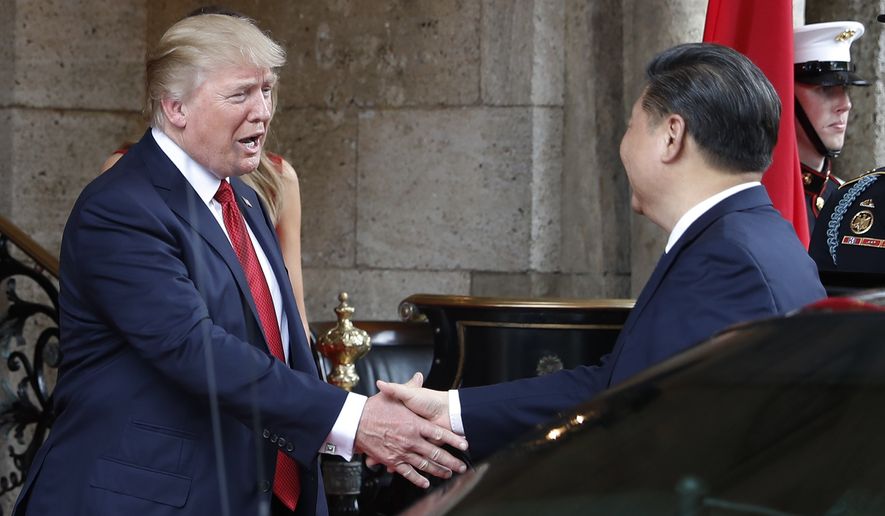ANALYSIS/OPINION:
There’s been a lot going on in recent weeks with the Stalinist regime of North Korea and its quest for a nuclear arsenal to threaten the world. It is obvious the Trump administration intends finally to stop talking and start doing something about this festering geopolitical sore. As Secretary of State Rex Tillerson said this week after the latest North Korean missile test, “The United States has spoken enough about North Korea. We have no further comment.”
President Trump, who is talking about the crisis on the peninsula with Chinese President Xi Jinping this week, summed up his expectations for Beijing thusly: “China will either decide to help us with North Korea or they won’t. … If they do, that will be very good for China, and if they don’t, it won’t be good for anyone.”
Mr. Trump has also heavily focused on assuring Japan of America’s commitment to its allies in the region. The president played golf, twice, with Prime Minister Shinzo Abe, and made sure the world saw a robust Japanese-American relationship. This greatly reassured the Japanese public that their American ally was still to be trusted.
However, you get a gold star if you can figure out the one critical ally that the Trump administration has so far reassured about the solidity of the bilateral relationship. In fact, no American ambassador has been named yet and this longtime friend will not be privy to this week’s talks between Mr. Xi and Mr. Trump at Mar-a-Lago.
Yes, I’m talking about that other Korea, the Republic of Korea. That would be South Korea — you know, the country whom we fought a war to preserve and a land where tens of thousands of Americans died in a war with North Korea that, technically, still hasn’t ended.
Yes, the United States is deploying the THAAD missile defense system in the South. However, this is a long-range, high altitude defense against ballistic missiles. This system is more likely designed to protect Japan and American assets in the region, such as Guam and other American outposts. By contrast, the immediate threat to the South, and Seoul in particular, is artillery from just across the DMZ. There are thousands of North Korean artillery tubes embedded in the mountains only a few miles from the South Korean capital. The North routinely has advertised its intention to turn Seoul into a “sea of fire” if war breaks out again.
The South has paid a price for agreeing to host THAAD on its territory. China really doesn’t like it, worried about a U.S. missile defense program in the same way the Soviets once did. Infuriated by THAAD, the Chinese are targeting South Korean economic interests such as tourism, where package deals to the South have been banned. South Koreans in China have been assaulted and South Korean businesses boycotted.
The communist government insists these events are just ordinary Chinese citizens expressing their anger, but obviously the violence is state-inspired.
So the South Koreans wonder: Why are we not being included in the debate when we are paying a price for standing up to Beijing and Pyongyang? Why hasn’t a U.S. ambassador been appointed to one of its critical friends in the region?
There is also the historical animosity between Koreans and the Japanese that dates back to WWII (and before) that must be taken into account. Perceptions in this debate are extremely important. When Seoul sees the Trump administration paying extra attention to Japanese security and the relationship with the Japanese prime minister, it has knock-on effects back home.
South Korea would like the U.S. to pressure China to end its economic pressure campaign. They would like to be included in the regional discussions about their future. Mr. Trump’s suggestion that the U.S. will “go it alone” if need be regarding the North Korean threat, and his outreach to Japan have plainly worried the South.
This is most likely just the result of the new Trump administration getting its geopolitical sea legs. However, it is a slight that needs to be rectified.
• L. Todd Wood is a former special operations helicopter pilot and Wall Street debt trader, and has contributed to Fox Business, The Moscow Times, National Review, the New York Post and many other publications. He can be reached through his website, LToddWood.com.
• L. Todd Wood can be reached at ltwood@123washingtontimes.com.




Please read our comment policy before commenting.